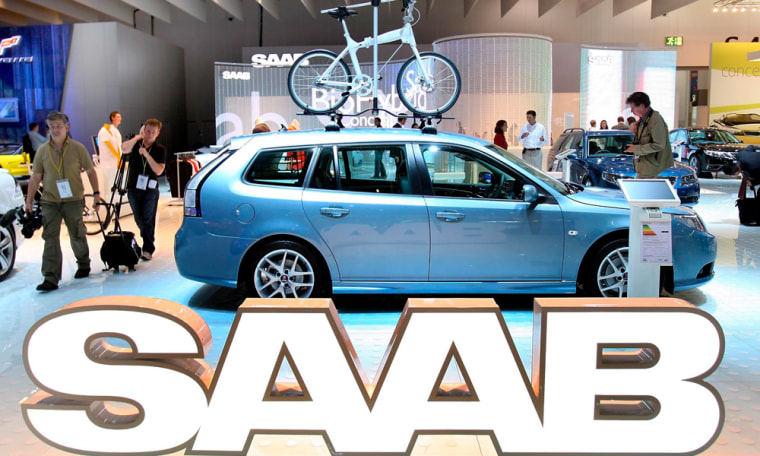A deal for General Motors Co. to sell Saab to a specialty carmaker has collapsed, leaving the storied Swedish brand born from jets in 1947 close to extinction.
Koenigsegg Group AB, a consortium formed by Swedish luxury sports car maker Koenigsegg Automotive AB, said Tuesday it pulled out of the deal in part because it was unable to agree with investors on how best to move the brand from mass-market to premium.
For GM, it was the third time this year that a deal to shed one of its brands fell apart as it tries to recover from a stay in bankruptcy protection by focusing on a core of four: Chevrolet, Buick, GMC and Cadillac.
The next move is up to GM's board, which will decide Saab's future in a few days. But with no apparent backup investors and the Swedish government refusing to buy Saab, GM may follow through on a contingency plan to let the brand die.
That jeopardizes the jobs of Saab's 4,500 employees, most of them in Sweden.
Joran Hagglund, a senior official at Sweden's Ministry of Enterprise, said the government will continue talking with GM, but the only solution for Saab is for another company to buy it.
"We have been very clear from day one that the government will not be the owner," he told reporters in Stockholm.
GM, which earlier this year conceded it has never made money with Saab, is unlikely to keep the brand, and industry analysts said any potential investors likely stepped away when Koenigsegg emerged as the buyer.
Matts Carlson, automotive analyst at Gothenburg Management Institute in Sweden, said Chinese automakers or Italy's Fiat Group SpA may still be interested, but he acknowledged there is a substantial risk that Saab could be closed for good.
The chairman of the Koenigsegg consortium told The Associated Press Tuesday that financing had been worked out, but as negotiations with GM and investors grew lengthy, it appeared less likely that Koenigsegg would be able to make money on the deal.
Analyst Carlson said the financial condition of Saab, which went into a court-protected restructuring Feb. 20, worsened since Koenigsegg announced plans to buy it in June.
"Saab's situation, they are losing market share all the time, could have given Koenigsegg cold feet," he said.
Koenigsegg, a tiny company that makes only a dozen high-performance luxury cars a year, was formed in 1994. Its headquarters and factory — which produces cars that cost more than a $1 million each — are at a former air force base in southern Sweden.
Earlier this month, GM's board decided to keep its European Opel unit rather than sell it to a group led by Canadian auto parts maker Magna International Inc.
In September, auto dealership chain owner Roger Penske scrapped plans to buy Saturn after an agreement to get cars from France's Renault fell through. The GM board decided to phase out Saturn, a possible fate for Saab.
But GM will keep and restructure Opel, which unlike Saab, is considered critical to GM's international operations. GM was worried that Opel technology would wind up in rivals' hands.
All three GM deals fell through because few people realize how difficult it is to unravel years of complex integration by global automakers, said Michael Robinet, a vice president at CSM Worldwide, an auto industry consulting firm near Detroit.
Disputes arose over use of technology, use of common parts and factories, and who would make cars after initial agreements expire.
Financing also had been a problem for the Koenigsegg group, which in August said it lacked about 3 billion kronor ($417 million) for the Saab deal. But in September, the consortium struck a deal with Beijing Automotive Industry Holdings for a minority stake to raise more money.
It will be difficult for Saab, founded as a Swedish aerospace company, to recover from Koenigsegg's decision. GM has been selling off existing inventory and preparing to end its role with the company, which would be hard to reverse.
Through October, GM sold only 7,441 Saabs in the U.S., a 62 percent drop from the same period in 2008. Two models, the 97-X SUV and the 9-3 sports sedan, make up most of the company's U.S. sales.
Analysts say GM, which bought half of Saab in 1990 for $600 million and the rest for $125 million in 2000, was unable to differentiate the brand from its other products or find a sales niche.
GM has one more chance to sell a brand. A deal for Chinese manufacturer Sichuan Tengzhong Heavy Industrial Machinery Corp. to buy Hummer still must be approved by the U.S. and Chinese governments.
The Koenigsegg decision comes as the fate of another Swedish automaker, Volvo Cars, remains up in the air. Last month, Ford Motor Co. announced that it had picked a consortium led by China's Geely Group as the preferred bidder, but the deal hasn't been completed.
